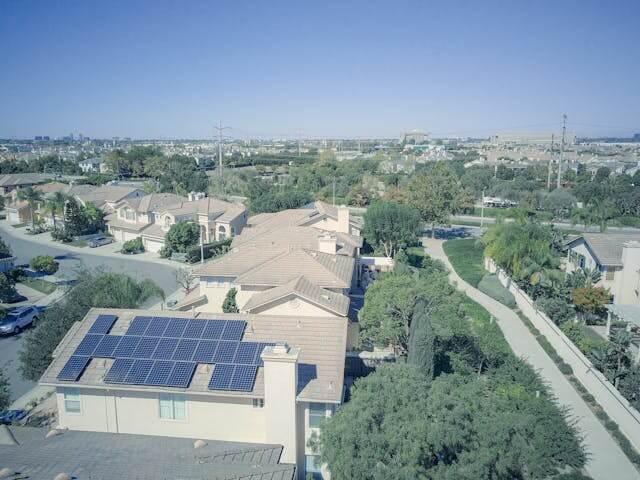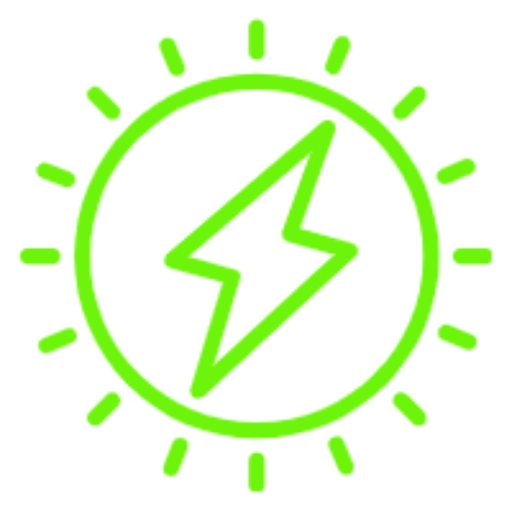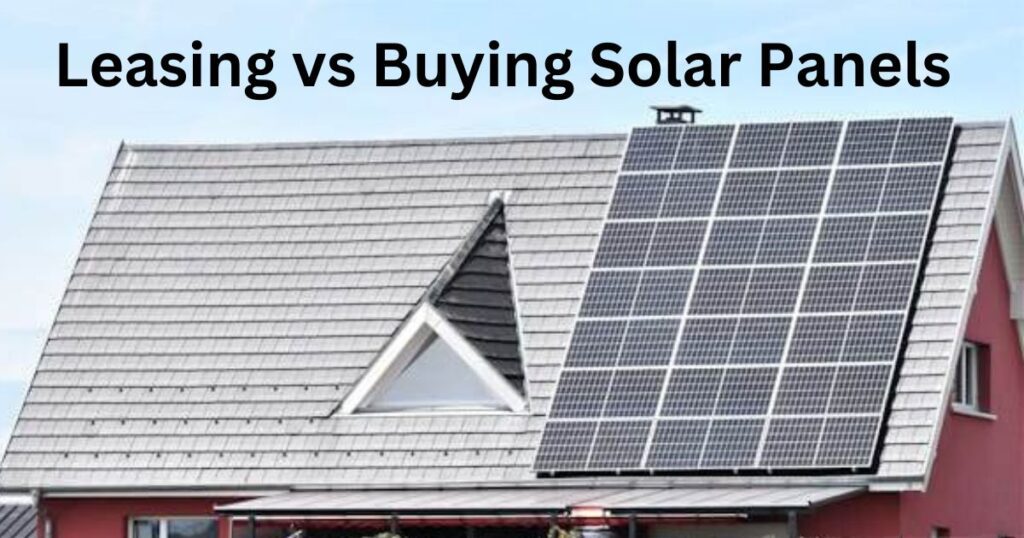Last updated on March 7th, 2025 at 03:39 am
As the world shifts towards renewable energy, the decision between leasing vs buying solar panels has become a critical consideration for homeowners and businesses looking to reduce their energy bills. Each option has its own set of advantages and drawbacks, and what works for one person might not be the best choice for another.
This article aims to provide a comprehensive guide to help you understand the key differences between leasing and buying solar panels. By exploring the pros and cons of each option, financial implications and practical considerations we hope to equip you with the knowledge you need to make an informed decision that suits your unique circumstances. This guide will help you determine which path to solar energy is right for you.
- Leasing solar panels typically requires no upfront cost and includes maintenance, while buying involves higher initial costs but offers greater long-term savings and ownership benefits.
2. Leasing means the company owns the panels and claims tax credits, whereas buying allows you to take advantage of federal and state incentives, potentially increasing your property’s value.
3. Leasing offers hassle-free maintenance managed by the provider, while buying gives you full control over the system, its upgrades, and long-term performance.
Leasing vs Buying Solar Panels: Key Differences
When considering solar energy for your home or business, a critical decision is whether to lease or buy your solar panels. Leasing solar panels involves a third-party company owning and maintaining the system, with you paying a fixed monthly fee for the energy produced. This option typically has low or no upfront costs, and the leasing company handles all maintenance and repairs.
In contrast, buying solar panels means you purchase and own the system outright, giving you full control but requiring a significant initial investment. Owners are responsible for maintenance and can benefit from tax incentives.
The financial implications of leasing versus buying are significant. Leasing solar panels is more accessible with minimal upfront costs, but the cumulative lease payments can be higher over time.
Buying, though expensive initially, can result in substantial long-term savings and increases your property’s value. Additionally, owned solar panels can be a selling point for your home, whereas leased panels might complicate property transactions due to the need for the new owner to assume the lease.
Maintenance, control, and flexibility are also important factors. Leasing provides hassle-free maintenance as the leasing company handles all repairs, but it limits your control over the system. Buying offers complete control and the ability to upgrade technology at will, though you bear the maintenance responsibilities.

Leasing vs Buying Solar Panels Comparison
| Aspect | Leasing Solar Panels | Buying Solar Panels |
| Ownership and Control | Third-party company owns the system. Less control over the system. | You own the system. Full control over its operation and upgrades. |
| Upfront Cost | Low or no upfront cost. | High upfront cost. |
| Long-term Cost | Monthly lease payments can add up over time. | Potential for significant long-term savings. |
| Maintenance and Repairs | Handled by the leasing company. | Your responsibility. |
| Tax Incentives | Not typically available to the lessee. | Eligible for tax credits and incentives. |
| Property Value Impact | Can complicate property transactions; new owner must assume lease. | Increases property value; seen as an asset. |
| Technology Upgrades | Often includes options for upgrades. | Requires new investment for upgrades. |
| Flexibility | More flexibility with upgrades within the lease agreement. | Complete flexibility over the system. |
Leasing Solar Panels: Considerations
how much to lease solar panels
The cost of leasing solar panels typically ranges from $50 to $200 per month, depending on factors such as the size of the system and your energy needs. Most solar lease agreements require little to no upfront payment, but some may include a small initial fee.
Lease terms usually span 20 to 25 years, with annual rate increases often between 2-5%. So, over a lease period of 20 to 25 years, the total cost of leasing solar panels typically ranges from $12,000 to $60,000.
Solar panel lease agreement
A solar panel lease agreement is a contract that allows you to use solar panels installed on your property without owning them. Typically, these agreements last between 20 to 25 years and involve a fixed monthly payment, with potential annual increases. The lease specifies that the leasing company retains ownership of the panels, handles installation, maintenance, and repairs, and claims any applicable tax credits or incentives.
The agreement outlines your rights to use the energy produced, details the process for handling property sales or transfers, and includes provisions for insurance and liability. Before signing, it’s crucial to review the terms thoroughly, understand your responsibilities, and compare offers from different leasing companies to ensure you get the best deal for your needs.
Tax credit for leased solar panels
Typically, the tax credits and incentives available for solar panels, such as the Federal Investment Tax Credit (ITC), are claimed by the owner of the solar system. Since a leased solar system is owned by the leasing company, they generally claim these benefits, not the lessee.
While you, as the lessee, cannot claim the tax credits, the benefits claimed by the leasing company can potentially be reflected in your lease payments. The leasing company might offer more competitive rates or better terms due to the financial benefits they receive from the tax credits.
Some local or state incentives might still be available to lessees, but this varies by location. It’s important to check with local programs to understand if any incentives are applicable to leased systems.
Solar panel leasing companies
Here are some well-known solar panel leasing companies that offer various leasing options for residential and commercial solar systems:
Sunrun
Sunrun, one of the largest residential solar providers in the U.S., offers flexible leasing and power purchase agreements (PPAs). They handle installation, maintenance, and repairs, providing a comprehensive warranty covering up to 25 years of proactive monitoring, free equipment replacement, system repairs, full insurance coverage, and an industry-leading roof penetration warranty. This ensures years of solar savings with zero maintenance required for homeowners.
Pros and Cons of Solar Leasing
Pros
- Low Upfront Costs: Solar leasing typically requires little to no initial investment, making it accessible for more homeowners.
- Maintenance and Repairs: The leasing company usually handles all maintenance and repair costs, ensuring the system remains in optimal condition.
- Fixed Monthly Payments: Leases often come with predictable monthly payments, which can make budgeting easier.
- Immediate Savings: You can start saving on your electricity bills immediately without waiting to recoup an initial investment.
- Performance Monitoring: Leasing companies often provide monitoring services to ensure the system operates efficiently.
Cons
- No Ownership: Since you do not own the solar panels, you cannot benefit from federal tax credits or state incentives, which are typically claimed by the leasing company.
- Long-Term Costs: Over the life of the lease, you may end up paying more than if you had purchased the system outright.
- Transfer Complications: Selling a home with a leased solar system can be complicated, as the new owner must agree to take over the lease.
- Potential Savings Limitation: Some lease agreements include escalator clauses, which increase payments over time and may reduce the overall savings.
- Less Control: You may have less control over the solar panel system, including its installation and potential upgrades, since it is owned by the leasing company.
Buying solar panels: Considerations
Upfront costs
Investing in solar panels involves a considerable upfront expenditure, with the average installation cost in the U.S. around $18,900. This initial cost can be substantial for many homeowners, but it is important to note that various financing options, loans, and incentives can help mitigate this expense.
Financing options such as solar loans allow for the cost to be spread out over several years, making the investment more manageable. Additionally, federal and state incentives, such as tax credits and rebates, can significantly reduce the overall cost. By leveraging these financial tools, homeowners can make the initial investment in solar panels more accessible and affordable.
Return on Investment (ROI)
Calculating the return on investment (ROI) for solar panels involves assessing both the payback period and potential long-term savings. On average, the payback period for solar panels is approximately 11 years. This is the time it takes for the savings on electricity bills to equal the initial cost of the system. Once this period is over, the system continues to generate savings, leading to a positive return on investment.
In fact, the average ROI for solar panels is around 177%, indicating that over the system’s lifetime, homeowners can expect significant financial returns. By evaluating these factors, homeowners can determine if the investment in solar panels will be financially advantageous in the long run.
Ownership Benefits
Owning solar panels offers several significant advantages beyond the immediate financial savings on electricity bills. One of the key benefits is the ability to take advantage of federal tax credits, which can cover up to 30% of the upfront cost of the solar panel system.
This substantial incentive effectively reduces the overall expense of installation. Additionally, many states offer their own rebates and financial incentives, further decreasing the cost and making solar energy more accessible.
Another important benefit of owning solar panels is the potential increase in home value. Studies have shown that homes equipped with solar panels often have higher market values compared to similar homes without them.
This is because solar panels are viewed as a valuable upgrade, appealing to environmentally conscious buyers and those seeking lower energy costs. As a result, owning solar panels not only provides long-term savings but also enhances the attractiveness and marketability of your home.
Wrapping up!
If you have the financial capability and plan to stay in your home for a long time, buying solar panels might be a better option due to the long-term savings and benefits. On the other hand, if you prefer lower upfront costs and less responsibility for maintenance, leasing could be a more suitable choice. Evaluate your financial situation, long-term goals, and the specifics of available lease agreements to determine which option aligns best with your needs.
Frequently Asked Questions (FAQs)

